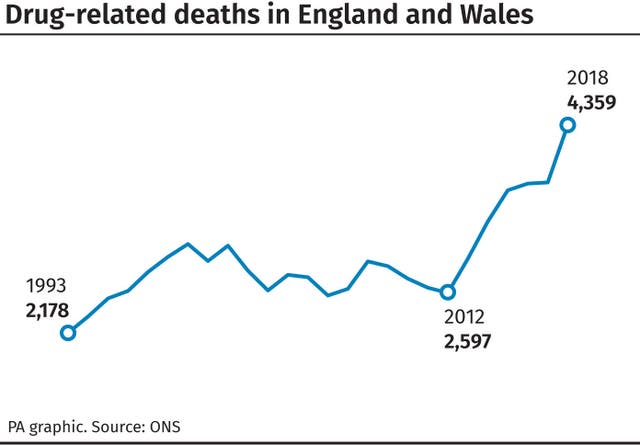
Drug-related deaths in England and Wales are the highest they have been since records began more than a quarter of a century ago, official figures show.
There were 4,359 deaths from drug poisoning recorded in England and Wales in 2018 – the highest number since records began in 1993, the Office for National Statistics (ONS) said.
The official body said it was also the highest annual increase since records began, rising 16% (603 deaths) from 2017.
More than half of the deaths involved an opiate (2,208 deaths), while deaths from new psychoactive substances, or legal highs, doubled in a year to 125.
And deaths involving cocaine doubled over the three years to 2018, reaching their highest ever level.
Charities responded by accusing the Government of failing to protect vulnerable people by “decimating” treatment funding, while the Royal College of Psychiatrists said the policies were “destroying lives”.

Ben Humberstone, deputy director for health analysis and life events at the ONS, said: “The number of deaths from drug use in 2018 was the highest since our records began in 1993. We have also seen the biggest year-on-year percentage increase.
“Previously, this had been linked to a rise in deaths related to opiates like heroin and morphine, but last year there were also increases in deaths across a wider variety of substances including cocaine and what had been known as ‘legal highs’.
“We produce these figures to help inform decision makers working towards protecting those at risk of dying from drug poisoning.”
The ONS figures cover deaths involving controlled and non-controlled drugs, prescription and over-the-counter medications.
They also include accidents and suicides involving drugs, and complications such as deep vein thrombosis or septicaemia from intravenous drug use.
Almost half of the deaths registered last year will have happened in previous years, due to the time it can take for an inquest to be completed, statisticians believe, adding that many deaths that occurred in 2018 will be missing from these figures.
Around two-thirds of drug poisoning deaths were from drug misuse (2,917) – continuing a trend seen over the last decade.
Males accounted for more than two-thirds of drug poisonings (2,984, compared with 1,375 females).
Most of the recorded deaths were due to accidental poisoning (80% of males and 67% of females), and then intentional self-poisoning (16% of males and 30% of females).

The remaining deaths were caused by mental and behavioural disorders as a result of drug use or assault involving drugs.
The North East had a “significantly higher” drug misuse rate (96.3 deaths per million people) than any other region, representing a wider north-south split.
Wales, the North West and Yorkshire and the Humber also had high drug misuse rates, while southern areas, including London (34.9 deaths per million), had the lowest.
Dr Emily Finch, vice-chair of the Royal College of Psychiatrists’ addictions faculty, said the rise should be a “wake-up call” to the Government that cuts have “starved” drug misuse services of money and are risking lives.
She said: “National decision makers need to wake up to the fact that swingeing cuts to services, disconnecting NHS mental health services from addiction services and shifting the focus away from harm reduction to abstinence-based recovery is destroying lives and fuelling the increase in drug-related deaths.”
Dr James Nicholls, chief executive of Transform Drug Policy Foundation said the deaths were “an avoidable tragedy”.
He said: “Current policy is not protecting people or their communities; instead it is blocking measures we know can save lives, while decimating treatment funding.
“People dependent on drugs don’t die from overdoses in supervised drug consumption rooms or heroin prescribing clinics. We need these approaches to be supported and funded in the UK.”
Mike Dixon, chief executive at drug and alcohol charity Addaction, called for a national push to promote Naloxone, a drug which can block the effects of opioids in overdoses, to give it the visibility and status defibrillators have.
He added: “The rise in cocaine deaths shows treatment services need to do more to reach out to this group. There’s an idea that people have to hit ‘rock bottom’ to access support and most people who use cocaine don’t consider themselves in this category.
“We need to shift this narrative to get more people into treatment that we know can save lives.”


Comments: Our rules
We want our comments to be a lively and valuable part of our community - a place where readers can debate and engage with the most important local issues. The ability to comment on our stories is a privilege, not a right, however, and that privilege may be withdrawn if it is abused or misused.
Please report any comments that break our rules.
Read the rules here